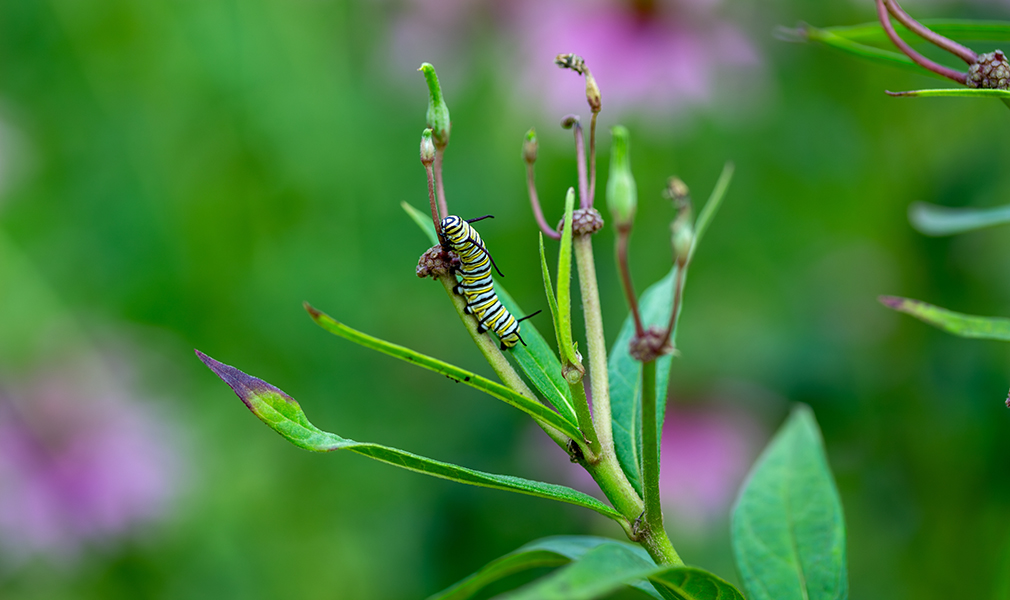
“Mental Health & Climate Change” is a monthly column by Elizabeth Bechard, Moms Clean Air Force Senior Policy Analyst, in which she explores how families are coping with our warming world.
We planted milkweed in our tiny townhome garden this past summer. Amid a season of harrowing wildfire smoke and devastating flooding in Vermont, it felt like a tiny, defiant act of hope to try to grow things. My seven-year-old twins insisted on milkweed because they love monarch butterflies, and monarch caterpillars feed exclusively on milkweed leaves. Caterpillar season is a thing for us.
For weeks, the twins would run out to the garden early in the morning to check the leaves for monarch eggs. And day after day, there were no eggs to be found.
Late in the season, a lone caterpillar finally showed up on one of the milkweed plants: bright green and unmistakably a monarch. We were overjoyed. We watched it for days as it munched happily away at the leaves at a speed that would put the hungry caterpillar to shame.
And then one morning, the caterpillar was dead, its tiny body curled into a lifeless ball. There would be no chrysalis, and no butterfly. We didn’t know why: maybe it was stung by a wasp, my son hypothesized. Maybe it was too lonely to keep living. Monarch butterflies are endangered, one of many species threatened by erratic changes in temperature and precipitation. Maybe it was climate change?
My daughter dug a miniature grave and fashioned a gravestone out of a leaf. Though they didn’t call it climate grief, I don’t know what else to call the disappointment written on my children’s faces as we said goodbye to the caterpillar. I don’t know how else to describe the dull ache in my heart as I told them, with no measure of certainty at all, maybe the monarchs will come next year.
We know that climate change is increasingly impacting our mental health in numerous ways, from the grief we feel when butterflies don’t come to the trauma that can accompany extreme weather events. And we know that children and young people are among the most vulnerable to nearly all the mental health impacts of climate change. Research on climate change and mental health has rapidly accelerated over the past several years, and a new report from ecoAmerica and the American Psychological Association offers an overview of the most current research on how climate change is impacting the mental health of children and youth.
A few of the report’s key takeaways:
- Climate change is one of many factors threatening youth mental health today. Other challenges impacting youth well-being include racism, economic insecurity, social media, gun violence, and more.
- The acute impacts of climate change can cause both short- and long-term mental health challenges for children. Extreme weather events like floods and wildfires can cause trauma and post-traumatic stress disorder in the immediate wake of a disaster, and without proper support, long-term mental health challenges can arise.
- Longer-term impacts of climate change, like poor air quality, drought, and heat, also affect youth mental health. These impacts are linked to increased risk of anxiety, depression, impaired cognitive function, and other mental health outcomes.
- Climate change amplifies existing inequalities, like systemic racism. Indigenous communities, communities of color, and other vulnerable communities are more likely to be exposed to extreme weather and often have less access to resources for coping.
- Climate change can affect children’s mental health before they are even born. Babies exposed in utero to extreme weather events, air pollution, high temperatures, and maternal anxiety are at higher risk for a number of adverse mental and behavioral health outcomes, including anxiety, depression, and ADHD.
- Adolescents’ mental health can be affected by climate change in a number of unique ways, from climate anxiety and distress about government inaction to the stress of disrupted schooling and economic insecurity.
Importantly, the report emphasizes the need for multiple layers of climate action in response to what we know: in order to meaningfully address climate change and young people’s mental health, we need systems-level changes, like a rapid transition to clean energy. We need community solutions, including climate action and resilience plans that prioritize the needs of children. We need support from school systems, teachers, and peer networks, including robust climate education and nurturing social networks. We need climate-ready health care systems and professionals, who can help screen early and often for climate distress in children and offer treatment for climate anxiety and trauma.
And we need to equip parents to support their children, which requires tending to parents’ well-being in the context of climate change too: “Parental support is a protective factor for young people’s mental and emotional well-being during a crisis. Parents who receive support for mental health are better able to manage their own anxiety and to support their children. Parents and families can help younger children to learn about climate change, manage their fears, find hope, and take age-appropriate action.”
As a parent, I often feel overwhelmed by the scope of the climate crisis. But I want my children to know that I’m doing everything I can to help make the future a healthier, safer place for them. I want them to know that it matters that we try to address the climate crisis, even if our efforts aren’t guaranteed. And I deeply hope these efforts will support their mental health as they grow older.
I don’t know if the monarchs will come back next year—but at my house, we’re going to keep planting milkweed and pollinators just the same.
TELL CONGRESS: SUPPORT YOUTH MENTAL HEALTH AND ACCESS TO CLIMATE EDUCATION




